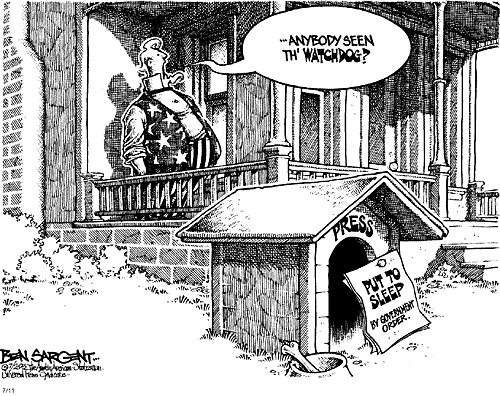Anonymous sources, continued

Nothing said on this site should be taken as representing the views of Freedom Communications or the Daily Press family of newspapers.
In a weird way, I’m starting to think the case of Judith Miller might actually be good for journalism.
For some years now, I’ve been depressed at the trend towards more and more timid reporting, on all levels. If there weren’t the off-chance my grandmother or very techie publisher were going to wander by and see this, I’d likely use stronger language to describe what I think of a lot of the reporting over the past decade or so.
The Judith Miller case is causing the industry, which was always given to the sort of endless introspection and navel-gazing normally only found in freshman philosophy majors, to suddenly realize they still have their cojones. (Sorry, Grandmother.) It’s partially a proprietary sense of outrage — “How dare they come after one of US?” as though Judith was the type to call up random small-town newspapers and take the newsroom out for beers and a round-robin on current events — but it’s also because of what she’s in jail for.
She did not, in fact, write anything about Valerie Plame. She was told something (quite important) about Valerie Plame. This is something that won’t necessarily seem as important to non-journalists as it actually is: Every day, we get told a LOT of things off the record. In a single one hour interview this afternoon, I was probably told seven or eight things off the record. And, contrary to what some TV shows or movies might lead one to believe, “off the record” does not mean “you won’t report on this.” It means “you won’t report on this using my name and my information.” Reporters can, and do, take off the record info and pursue other sources for the same information — it’s a whole lot easier breaking something loose when you know what you’re looking for. In other words, off the record information is, essentially, the most everyday version of anonymous sources.
In this brave new world, those seven or eight things I heard off the record could land me in jail, if someone was upset enough that I knew about them. Now, the truth is, most off the record information just isn’t that interesting or scandalous except to the person asking it not be printed in the paper. It would rarely be printed even if it had been on the record. It’s personal information about their lives or what they really think about someone but would be impolitic to say in public. But often enough, it’s something real. Since being at the Hesperia Star, I can think of one major story that would definitely fall under the shadow of the Judith Miller case insofar as how I originally obtained the information. It was a story that, if I can risk being immodest a moment, Hesperians were better off having made public, and one that powerful folks were unhappy about me writing at the time. If Judith Miller had gone to jail 12 months ago, it might never have been published.
And that’s what’s scared and upset so many journalists. After years of not doing their jobs, or phoning it in, it feels — rightly or wrongly — like the government isn’t going to let them do those jobs at all, not in the way they know they should. And suddenly, the slumbering Fourth Estate has woken up.
Better late than never.
No Comments »
No comments yet.
RSS feed for comments on this post.
Leave a comment
Line and paragraph breaks automatic, e-mail address never displayed, HTML allowed: <a href="" title=""> <abbr title=""> <acronym title=""> <b> <blockquote cite=""> <cite> <code> <del datetime=""> <em> <i> <q cite=""> <s> <strike> <strong>
